15+ Sample Security Deposit Agreement
-
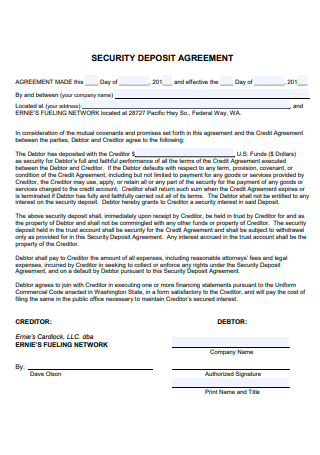
Security Deposit Agreement Template
download now -
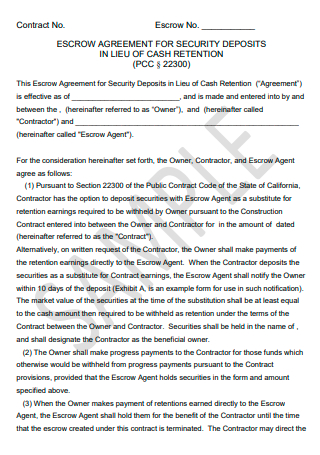
Sample Security Deposit Agreement
download now -
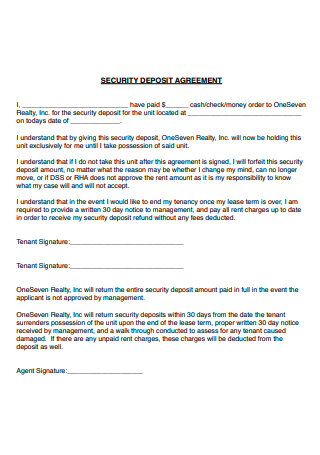
Security Deposit Agreement Example
download now -
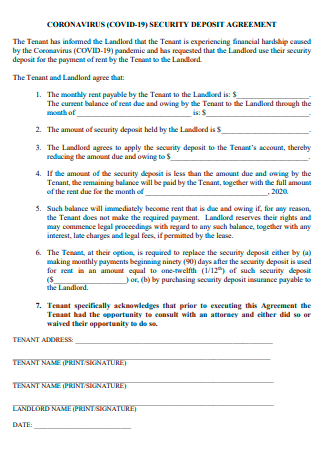
Covid-19 Security Deposit Agreement
download now -
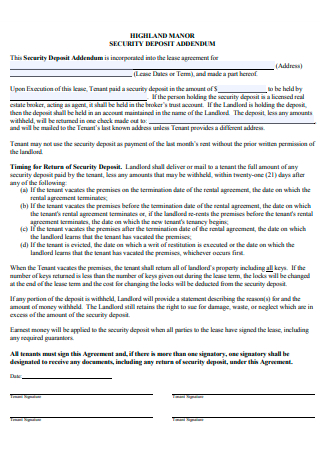
Security Deposit Lease Agreement
download now -
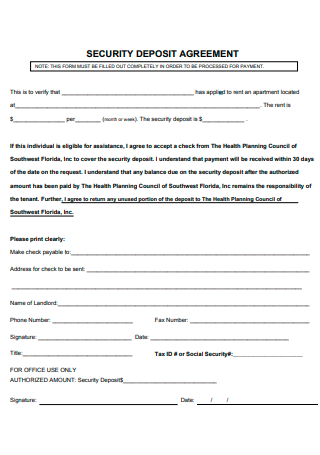
Formal Security Deposit Agreement
download now -
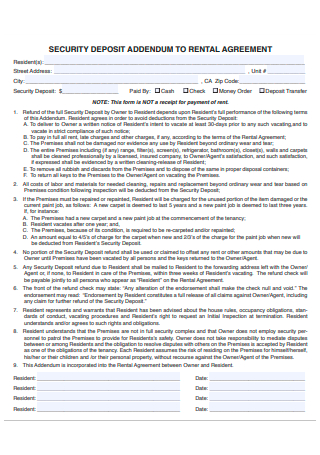
Security Deposit Addendum to Rental Agreement
download now -
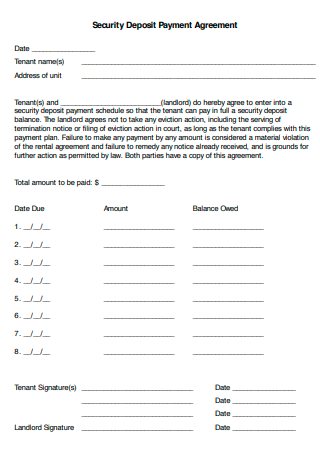
Security Deposit Payment Agreement
download now -
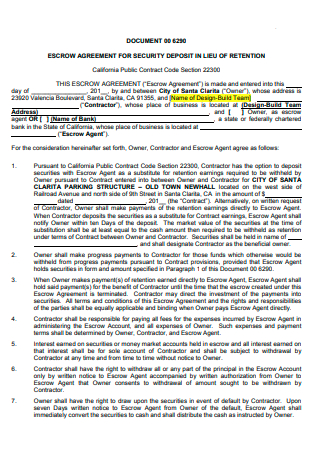
Security Deposit in Lieu of Retention Agreement
download now -
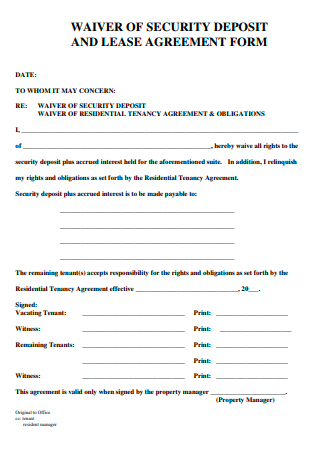
Security Deposit and Lease Agreement Form
download now -
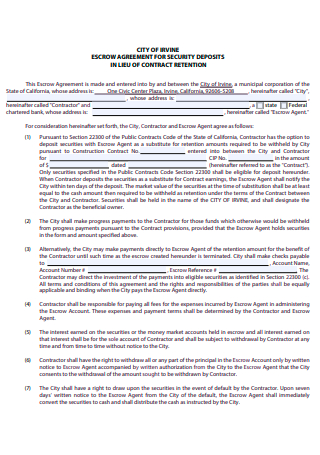
Security Deposit in Lieu of Contract Retention Agreement
download now -
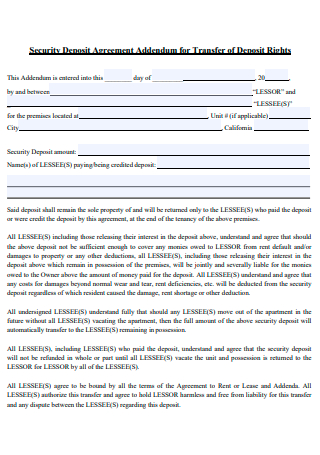
Secuity Deposit Agreement Addendum For Transfer of Deposit Rights
download now -
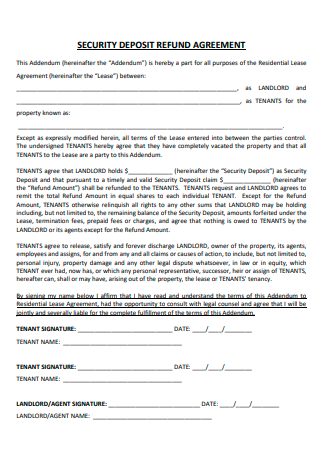
Security Deposit Refund Agreement
download now -
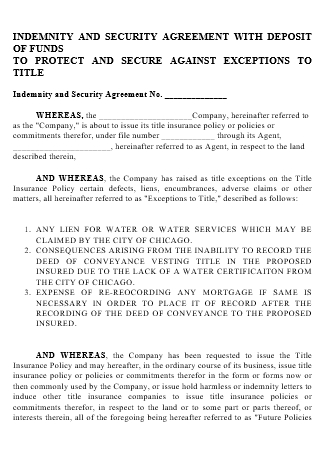
Security Deposit of Funds Agreement
download now -
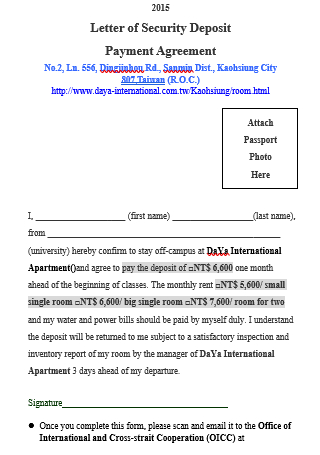
Security Deposit Payment Agreement Letter
download now -
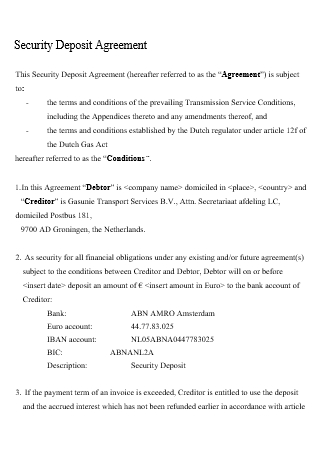
Security Deposit Agreement in DOC
download now
FREE Security Deposit Agreement s to Download
15+ Sample Security Deposit Agreement
What Is a Security Deposit Agreement?
How does a Security Deposit Works?
What Is the Difference between a Security Deposit and Last Month’s Rent?
What Happens if Damages Are More than My Security Deposit?
What Is the Purpose of a Security Deposit Agreement?
What Are the Benefits of a Security Deposit Agreement?
Elements of a Security Deposit Agreement
How to Write a Security Deposit Agreement
FAQs
What Is a Security Deposit Agreement?
Deposits are monetary sums made to a lender, seller, or landlord as a kind of proof of purpose. It refers to the amount of money that has been deposited in advance and is being held in reserve in the event that the depositor fails to fulfill his or her contractual obligations. In accordance with the terms of the transaction to be indicated in the security deposit agreement, the deposit can either be refundable or non-refundable in nature. This “security deposit” is intended to serve as a measure of protection for both the giver and the receiver, hence the name.
Other templates are available on our website, and you can use them whenever you need them. They are as follows: business proposal, employment contract, labor contract, employer agreement, rental deposit receipt, lease agreement, landlord security deposit form, receipt deposit agreement, tenancy contract, disclosure agreement, and other similar templates are available. This post will not only provide you with templates but will also provide you with important information that you need to know in order to complete your template.
How does a Security Deposit Works?
Landlords are not obligated by law to collect security deposits from their renters, but it is in their best interests to do so in order to protect their investment. When a renter understands that their actions will decide whether or not they receive their entire security deposit returned, they are more inclined to refrain from destroying the property and adhere to the terms of their lease. In the event of damage, a landlord can remove money from the security deposit rather than file a lawsuit against the tenant to recover the cost of the repairs. An owner of a rental property cannot keep the money in their business or personal account. It is, nevertheless, available to the landlord when and if the funds are required by the tenant.
What Is the Difference between a Security Deposit and Last Month’s Rent?
If your contract stipulates that your security deposit is to be considered your last month’s rent, then the money cannot be utilized for anything other than rent. This money is non-refundable and cannot be used to repair damage to the apartment. If your landlord requires only the last month’s rent in advance and does not require a security deposit, the property manager or landlord has assumed financial responsibility for any damage caused to the unit by the tenant.
What Happens if Damages Are More than My Security Deposit?
The objective is to retain your flat in good shape and to obtain a full refund of your security deposit, but things do not always go as to plan. In rare instances, your landlord may require additional money in addition to your first security deposit. The procedure that your landlord must follow varies by state, but in most circumstances, they will send you a letter outlining the damages, repair costs, and requesting payment of the difference. If you fail to make the shortfall, your landlord may pursue you in small claims court. While paying more than your original security deposit is not ideal, it is important to pay off your landlord’s arrears as soon as possible to prevent a troublesome scenario later. If you believe you should contest your landlord’s claim, consult an attorney.
What Is the Purpose of a Security Deposit Agreement?
Because the landlord is putting his property in the care of a renter whom he may or may not have known in the first place, numerous things can go wrong and the property may sustain harm. The security deposit will assist the landlord in covering damages, excessive wear and tear, unpaid rent, and other unsatisfied conditions. Additionally, the security deposit serves as an incentive for the renter to pay rent on time and to exercise reasonable care to avoid property damage.
1. Calculating the Security Deposit
Different countries and states have enacted legislation regulating security deposits in unique ways. Generally, the amount of the security deposit needed of the tenant is determined by the monthly rental value. Some states require a deposit equal to two months’ rent, while others have no such requirement. Additionally, you may be interested in purchasing agreement samples. Other states impose a fine equal to between one and three months’ rent. For the tenant’s clarification and knowledge, this amount must be included in the security agreement deposit.
2. Taking Possession of a Security Deposit
State regulations additionally specify how security deposits should be stored and whether interest must be paid, although this information must be included in the security deposit agreement in the event that the renter is not informed.
Numerous jurisdictions mandate that a security deposit be kept separate from the landlord’s personal or other business accounts, and some states even compel the landlord to deposit the security deposit in an interest-bearing trust account and pay the tenant any accrued interest. Again, this must be stated plainly and succinctly in the security deposit agreement. Additionally, you can review partnership agreement examples & samples.
3. Applying for a Security Deposit
Oftentimes, state regulations specify how a landlord must apply the security deposit upon the tenant’s move-out. A security deposit may be used to pay past-due rent and any damages to the property caused by the renter that exceeds reasonable, customary, or expected wear and tear. Additionally, it may be used to reimburse outstanding utilities or to clean the premises upon the tenant’s departure. You may be interested in sample basic agreement letters. In rare instances, the security deposit may also be used to restore or replace the tenant’s personal items. You can obtain additional information on the use and application of security deposits by contacting your local housing agency.
4. Reimbursement of a Security Deposit
Varied states have different time limits for recovering the security deposit, but it often ranges from 10 to 45 days or even longer after the renter vacates the rented property. Generally, landlords are obligated to account for any deductions, which must be itemized, for tenant-caused damage to the property. The list must be mailed to the tenant’s last known mailing address within two to three weeks following the tenant’s departure. This notifies the tenant that his or her security deposit has been used for the specific goods on the list and that he or she may claim only a portion of the deposit or none at all. Additionally, you can view sample buyout agreements.
What Are the Benefits of a Security Deposit Agreement?
Apart from the depositor, the person who collects the security deposit may gain from the money. This is mutually beneficial for both sides, which is why both parties would typically agree on the requirement for a security deposit. In terms of rent, landlords or landladies typically collect security deposits from renters, but they are not compelled to do so. The following are the primary advantages of collecting a security deposit:
1. Tenants Will Exercise Greater Caution
Generally, a security deposit is fully refundable to the tenant if the tenant does not cause damage to the rented property. If a tenant is aware that their actions would affect whether they receive their entire security deposit back, they are more inclined to take extra care to prevent causing harm. Additionally, they will adhere to the conditions of their fundamental agreement, ensuring peace and harmony between the parties.
2. Protect Yourself from Harm
By collecting a security deposit, the landlord can quickly deduct funds from it rather than suing the renter for the damages. Thus, the landlord will be instantly reimbursed for any expenses used in repairing the tenant’s damages. Additionally, you can view bank deposit slip examples and templates.
3. Protect Yourself from Non-Payment
Additionally, there are instances where a tenant defaults on their rent and immediately vanishes. In this instance, the landlord is protected against potential loss when he requests a security deposit, which is often equal to one month’s rent or more.
Elements of a Security Deposit Agreement
When writing a security deposit agreement, it is critical to include all necessary requirements and information, as well as to ensure that the conditions are clear and complete for both parties, since this will function as a legally binding document. Among the most critical items to include in your security deposit agreement are the following:
How to Write a Security Deposit Agreement
Each lease agreement should include a section requiring a security deposit. While each landlord is free to customize this section, the state in which your rental property is located may have specific security deposit rules that you must adhere to. Regardless of state legislation, there are several fundamental conditions regarding security deposits that you should always include in your agreement.
Step 1: Amount
The lease clause should specify the precise amount of the security deposit you will collect.
Step 2: Deposit Safekeeping
The lease provision should specify how the tenant’s security deposit will be stored. Certain states mandate that the deposit be held in escrow, while others do not.
Step 3: Rate of Interest
Certain states require you to keep the security deposits of your tenants in an interest-bearing account. You must inform your tenants of the interest rate on their security deposit.
Step 4: Maintaining the Deposit
The deposit agreement should specify the circumstances under which you may deduct funds from the tenant’s security deposit.
Step 5: Deposit Refund
Include the procedure for repaying the security deposit of a renter. You must return the deposit within a specified number of days of tenant move-out, as determined by your state’s law.
When writing a security deposit agreement, it is critical to include the following terms: amount, deposit storage, interest rate, keeping the deposit, and deposit return. The contracting parties’ terms and conditions must be specified precisely to avoid misunderstandings.
FAQs
Is there a maximum security deposit that can be collected?
The maximum-security deposit amounts vary per state. Some states have a cap. Other states have no maximum and leave it up to the landlord.
Can I contest my landlord’s allegations and obtain a refund of my security deposit?
Your security deposit may be disputed if you believe your landlord has unlawfully withheld it. Take pictures of the rooms, flooring, and ceilings during your move-in and move-out inspections in case your security deposit is disputed.
Can security deposits be used to offset the cost of rent?
No, it’s added to the rent. Most landlords need a security deposit and the first month’s rent before you move in.
A security deposit benefits both parties involved in that it secures the tenant’s or buyer’s reservation and protects the landlord in a rented property. The security deposit provisions must be established in a formal agreement called a security deposit agreement, which must be concise, clear, and comprehensive for both parties. The primary benefits of collecting security deposits for landlords are as follows: tenants will be more cautious, it acts as a safeguard against property damage, and it acts as a safeguard against tenant non-payment.
